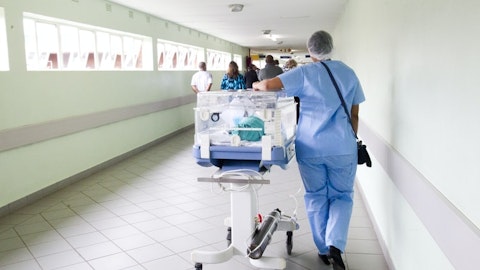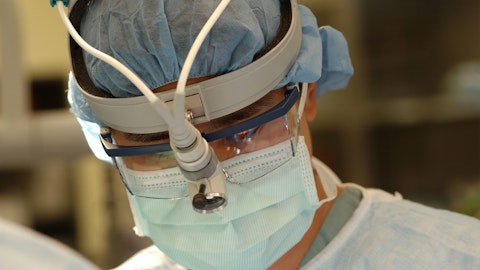Raymond Cohen: Yeah, thanks, Mike. You know, when you’re asking a question I just keep thinking about what’s going to be the headline in your report that you’re going to put out after we finish. In any event, it’s going to have something to do – the way I answer this question might show up in this headline about the third leg on the stool, right. But you’ve already used the word boycott, so that’s good inspiration.
Dan Dearen: Use the word focus, Mike, So, look, I think that it’s not as if there are folks who come to us with all kinds of other opportunities and various different products that could fit even within the urology or urogynaecology arena. I just think that we’re early as a company. We would just continue to kind of get that point across, it’s three years since we’ve been commercial distribution and as you know, we’ve got this thing about execution and doing things well with quality and we don’t want to lose focus. This is such a greenfield opportunity that I think if all of a sudden we were to bring something new to the game that maybe deals with men or some other kind of urology product, I think that – I would be a little circumspect if I was sitting on the outside, I mean this is such a big opportunity that I think a lot of companies would be quite envious of what we’re looking at.
So, therefore, we’re going to stick to our knitting. It’s not to say that we won’t add additional, let’s say, things that could make things easier in the future, et cetera, et cetera, but we’re going to kind of focus in this area of incontinence and for the foreseeable future and then we’ll reevaluate, but our goal is as we’ve stated, number one, market leadership in sacral neuromodulation and we are more than three-quarters of the way to that goal right now, so we’re going to continue to press that hard and we’d like to be a $0.5 billion company, and we think that’s within our grasp and then maybe things change for us, and we have more levers to push at that point, but you’re not going to be surprised by some announcement that all of a sudden, we decided to get into BPH or something like that, that’s not the direction that we’re thinking about, so I appreciate the question.
Michael Polark: Understood, thank you.
Operator: Thank you. Our next question comes from the line of Shagun Singh with RBC Capital Markets. Your line is now open.
Shagun Singh: Great, thank you so much for taking the question. Just one topic from me, you talked about a big focus on same-store sales and doubling and tripling volumes, where are these patients coming from anecdotally, what are you hearing from customers on volume and demand in 2023? And then just on awareness, what are the levels of awareness for medical device intervention options, is it quantifiable, is it like in the single digits, double digits, like anything you can share? And I’m sorry I missed the DTC spend for 2023, can you just remind me what the amount was? Thank you.
Raymond Cohen: So we spent about $20 million in 2022 on DTC, we’ll spend approximately the same amount in 2023. Where the patients coming from, they exist in every physician’s practice in urologists and urogynecologists, they’ve been walking in the door and out the door. They will get the drug prescription and walk out the door and never coming back and we have proven this to a lot of our customers by just getting a mail or a simple letter in the mail to their existing customers saying, hey, we’ve got new technology, you may want – specific to your problem, you may want to consider coming back in here, want to fill out symptom questionnaire and we’ll get you scheduled. It is unbelievable how many new patients get activated. We’ve talked about Botox numerous times, the fact that about 150,000 women got Botox in 2022, well, 15% or 20% of all the customers that – all the patients that we treat have previously had Botox.




